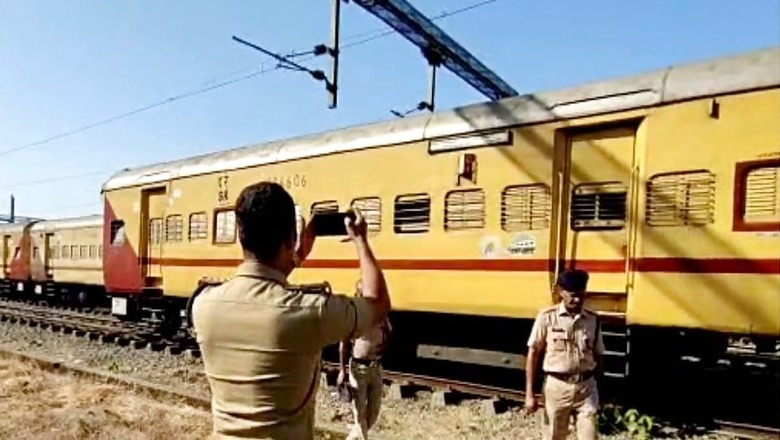
views
Keralites were shocked to learn that on April 3, 2023, three people, including a child, were killed and nine others received burn injuries after an unidentified person poured petrol on fellow passengers and set them afire inside the D1 coach of the Alappuzha-Kannur Executive Express at Elathur in Kozhikode at about 9.45 PM. One of the passengers who suffered minor burn injuries stated that the man came suddenly without a word or sound, sprayed petrol on the unsuspecting passengers, and set them ablaze. There was panic and passengers were running helter-skelter. In the melee, the suspect made good his escape.
The accused, later identified as Shahrukh Saifi, was apprehended in Ratnagiri district in Maharashtra, about 1,000 kilometres north of Kerala, and was brought to Kozhikode by the police. A Special Investigation Team (SIT) of the Kerala Police has been set up to probe the incident. The National Investigation Agency (NIA) has stepped into the probe suspecting a terror angle. The Railway Protection Force (RPF) is also involved in the investigation.
The volatile political atmosphere of Kerala went into a tizzy, with debates raging, some suspecting a botched terror plot, others suspecting an attempt reminiscent of the Godhra train burning of February 27, 2002. Either way, fear has gripped the state, and concerns are being raised about the safety of ordinary train travellers. While ministers, select politicians and bureaucrats enjoy extensive security cover at taxpayers’ expense, the common man is completely exposed and extremely vulnerable to armed violence, incendiary explosions and sabotages. Rail security stands on an entirely different footing from air security. Passenger traffic in the Indian rail sector in the year 2022 stood at 3.52 billion. The Indian Railways (IR) manages the fourth largest national railway system in the world by size, with a total route length of 68,043 km (42,280 mi), running track length of 102,831 km (63,896 mi) and track length of 128,305 km (79,725 mi) as of March 31, 2022. The whole network of the IR across the country has 7,083 stations. Providing end-to-end security for rail passengers and freight is simply not feasible or viable. The risk factor is enormous and will continue to remain so.
The problem in the instant case is the rapid political colour the case is taking. People genuinely suspect that a local investigation will be an eye-wash, as the religious identity of the suspect will have an overwhelming bearing to prevent a free and fair investigation. The state, which is already agitated over issues like love jihad, narcotics jihad, and land jihad, does not trust the present political dispensation to do a full and unbiased investigation and bring all the facts to the public domain. There is great unease among different communities about the proliferation of terror groups, gold smuggling, suspected Hawala funding and the growing drug addiction among the young generation. All these issues have not seen any kind of finality in case investigation, prosecution or even cessation of recurrences. In such a surcharged atmosphere, there is a deep concern that the present train-burning incident is unlikely to make any headway.
The facts available in the public domain, as of today, reveal that the suspect with his deadly consignment, never encountered any hitch in boarding the train and doing his dastardly act. Affected passengers were attempting to flee away from the scene to save themselves, hence absolutely no attempt to apprehend the culprit. In fact, he appears to have travelled for quite a distance on board the train, without anybody even questioning the burn marks and disfigurement on his face. He seems to have got out of the train with the same ease with which he boarded, to get medical attention for his injuries. This makes people genuinely suspect that there might have been other accomplices on board the train. One thing that stands out glaringly is the total security-free environment prevailing on the rail network.
Be that as it may, what is more important is the investigation status and the agency which going to handle it. The Indian legal framework is so complicated and time-consuming that there is sufficient time for the villains to erase evidence, escape from the country as well as fabricate an alibi. Already there are lawyers who are claiming that the suspect is mentally unsound, questioning the identity, and the suspect has also denied any involvement. Security agencies are wrangling as to who should investigate. By the time these issues are sorted out, the case will be in limbo, for a considerable length of time, thereby making all investigations meaningless and otiose.
It is high time the judiciary takes suo-motu cognisance of the terror threat to the nation and puts in place a permanent national multi-disciplinary investigation arrangement into all cases of suspected terror dimension.
The author is IRS (Rtd), Ph.D. (Narcotics), Former Director General, National Academy of Customs, Indirect Taxes & Narcotics (NACIN). Views expressed are personal.
Read all the Latest Opinions here




















Comments
0 comment